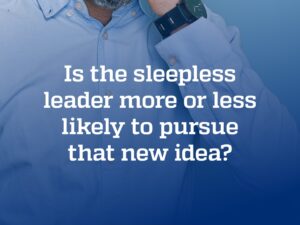Summary
Previous research has found the occasional experience of ADHD-like tendencies—which include restlessness, lack of focus and attention, and hyperactivity—to be a driver of entrepreneurial intentions. While the idea of the ‘sleepless founder’ has been challenged in recent times (it being hard to argue sleep-deprivation makes for better decision-making) the authors suggest transitory sleep problems, by stimulating ADHD-like tendencies, can potentially encourage people to start a new business, back a new venture or invest time in a new idea. The implications for stakeholders seeking to foster entrepreneurship cannot be dismissed. Meanwhile for a global population increasingly afflicted by imperfect sleep patterns, this research suggests at least one small silver lining.
Entrepreneurship is the engine room of economic growth, development and value creation globally. A dynamic process that not only increases financial prosperity but also plays an important role in changing society for the better. Entrepreneurs take on risks in the hope of making profit, but also to find solutions to the toughest challenges facing society and the planet. They are people with strategic vision and the drive to realize that vision.
Yet for employers, investors and other stakeholders looking to support potential entrepreneurs, or to encourage entrepreneurial thinking in their organization—there is no reliable guide to finding these individuals or to assessing their likely success.
Despite considerable research in the area it is still not obvious why some people become entrepreneurs despite all of the associated risks, while the majority do not choose that path, despite the potential benefits to themselves and to society. In recent years considerable research has gone into discovering what makes an entrepreneur tick. Various individual differences and personality traits have been examined to find what might prompt individuals to become entrepreneurs. Through studies of neurodevelopmental disorders, ADHD (Attention Deficit Hyperactivity Disorder) or a tendency to engage in behaviors reminiscent of ADHD have emerged as a notable driver of entrepreneurship.
ADHD-like tendencies and entrepreneurial intent
Although the classic symptoms of ADHD—hyperactivity, impulsivity, and a lack of attention and focus—are largely unproductive in the workplace, entrepreneurship research suggests that ADHD-like tendencies can heighten entrepreneurial intentions. People with these tendencies are inclined to be disaffected with standard jobs and attracted to a more flexible, entrepreneurial lifestyle—even while knowing this is likely to involve greater financial and career risk.
‘ADHD-like tendencies’ refer to the temporary experience of symptoms resembling ADHD. Many psychologically ‘normal’ individuals experience ADHD-like tendencies at times—a morning spent struggling to concentrate, a distracted afternoon. The temporary experience of such tendencies, whatever their source, can heighten entrepreneurial intent—i.e. intent to pursue an idea, be it to create a new product or found a new business.
Sleep problems leading to ADHD-like tendencies
Although ADHD-like tendencies are recognized to heighten entrepreneurial intentions, very little is known about the sources of these tendencies, and thus about the factors that might stimulate them in the real world.
Research by Brian Gunia, Ph.D, a Johns Hopkins Carey Business School professor and Core Faculty member of the Center for Innovative Leadership, highlights sleep problems as a ubiquitous biological factor that can drive ADHD-like tendencies, and links the incidence of sleeplessness to entrepreneurial intentions. Four separate studies support these predictions, adding several counterintuitive twists to the entrepreneurship literature and highlighting some important nuances for the way social commentators, entrepreneurship educators, and prospective entrepreneurs think about sleep problems—as well as those leading intrapreneurship projects.
The significance of these findings broadens when we consider that, in the same way ADHD-like tendencies are often transitory and can be experienced by individuals not formally diagnosed as ADHD sufferers, so too are sleep problems also mainly transitory. Temporary sleep problems, leading to ADHD-like tendencies, can then nudge otherwise biologically and neurologically ‘normal’ people toward entrepreneurship. This is an example of how an individual’s physical life and physiological state can directly affect their behavior at work.
Wake up to reality
As a rule, having trouble sleeping or failing to get a good night’s sleep is purely a negative experience, and when prolonged this can be seriously detrimental to someone’s health. To date, studies in this area largely suggest that poor sleep merely results in negative consequences such as diminished creativity, increased exhaustion, poor performance, and suboptimal decision-making capacity.
Professor Gunia and his co-authors’ findings—first that impermanent sleep problems causally elicit ADHD-like tendencies; and second that impermanent sleep problems directly or indirectly heighten entrepreneurial intentions—point toward a ‘silver lining’ around sleep problems: that they may potentially have a positive effect on the rate of business venturing and consequently on value creation and innovative solutions to societies’ many problems.
On the other hand, the authors recognize that protracted sleep problems could hinder the longer-term success of an individual entrepreneur. Sleep problems that continue unabated after the formation of entrepreneurial intentions could clearly affect the individual entrepreneur’s long-term decision making and performance. Overall, it is important to take a balanced view—taking account of the potential positive implications of sleeplessness as a catalyst for entrepreneurship, but also its longer-term risks.
Practical Implications
The findings from this research suggest some potentially important implications for practice. First, that there should be a greater social acceptance of diversity in sleep patterns, and that social commentators should reconsider whether impermanent sleep problems are all bad—as they are usually painted.
Second, while most entrepreneurial training aims to develop key competencies and the ability to identify and exploit opportunities, these findings suggest that these topics should be supplemented with a discussion about how would-be entrepreneurs may feel more entrepreneurial at some times than others—even without any discussion of sleep problems. By validating variation in entrepreneurial intentions over time and teaching individuals that entrepreneurial intentions are more likely to emerge under certain circumstances, and in certain physiological states, such training may help them deal with doubts or anxieties and leverage their less judgment-driven and more a-rational tendencies.
In view of the negative effects of sleep disorders, individuals considering entrepreneurship should not actively deprive themselves of sleep, or ‘burn the midnight oil’ to the point of physical detriment. Of course, like many others, they may be unable to avoid at least occasional sleeplessness. The message from this study is that individuals can reap benefits from sleep problems they cannot avoid, but this is not a license to proactively curtail their own sleep.
Finally, prospective entrepreneurs may wish to reevaluate their ideas after treating or overcoming their sleep problems, or at least after engaging in compensatory activities like mindfulness exercises. They might also be advised to seek out well-rested partners or advisors who can complement their tendency toward a-rational action and can offer frank feedback on the wisdom of their ideas.
A Question of Balance
In the interest of fostering entrepreneurship and business venture creation, it is important for employers, investors, and other supporters to look outside the box in order to unlock innovation and embrace new ideas. Unconventional individuals including those displaying certain ADHD-like symptoms or sleep challenges may have much to offer in this area.
In the case of people with ADHD-like tendencies there is clear evidence of heightened entrepreneurial intentions. With sleep problems—largely seen in a negative light, but representing an increasing reality around the world—their effects on entrepreneurship deserves to be acknowledged.
Allowing for the downside of persistent sleeplessness, the research indicates that temporary sleep problems may provide an initial nudge toward entrepreneurship, and the numerous societal benefits including but extending beyond wealth creation.
Access the original research paper: ‘The Weary Founder: Sleep Problems, ADHD-Like Tendencies, and Entrepreneurial Intentions,’ Gunia, B. C., Gish, J. J., & Mensmann, M. (2021). Entrepreneurship Theory and Practice, 45(1), 175–210.



